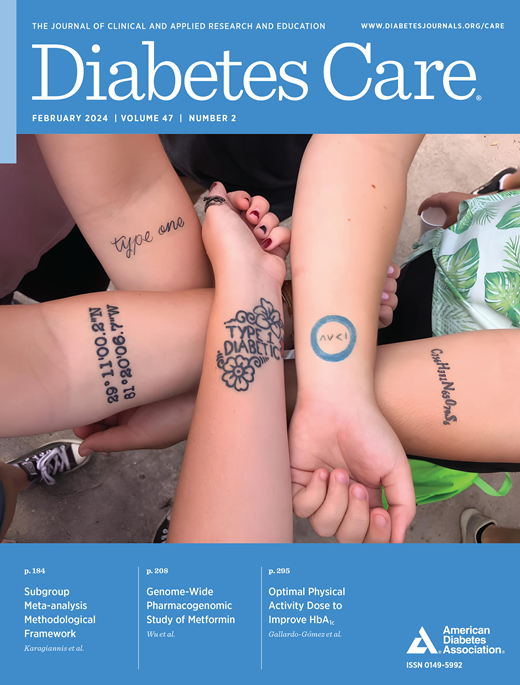Effect of 5:2 Regimens: Energy-Restricted Diet or Low-Volume High-Intensity Interval Training Combined With Resistance Exercise on Glycemic Control and Cardiometabolic Health in Adults With Overweight/Obesity and Type 2 Diabetes—A Three-Arm Randomized Controlled Trial
IF 14.8
1区 医学
Q1 ENDOCRINOLOGY & METABOLISM
引用次数: 0
Abstract
OBJECTIVE We aimed to examine the effects of a 5:2 regimens diet (2 days per week of energy restriction by formula diet) or an exercise (2 days per week of high-intensity interval training and resistance training) intervention compared with routine lifestyle education (control) on glycemic control and cardiometabolic health among adults with overweight/obesity and type 2 diabetes. RESEARCH DESIGN AND METHODS This two-center, open-label, three-arm, parallel-group, randomized controlled trial recruited 326 participants with overweight/obesity and type 2 diabetes and randomized them into 12 weeks of diet intervention (n = 109), exercise intervention (n = 108), or lifestyle education (control) (n = 109). The primary outcome was the change of glycemic control measured as glycated hemoglobin (HbA1c) between the diet or exercise intervention groups and the control group after the 12-week intervention. RESULTS The diet intervention significantly reduced HbA1c level (%) after the 12-week intervention (−0.72, 95% CI −0.95 to −0.48) compared with the control group (−0.37, 95% CI −0.60 to −0.15) (diet vs. control −0.34, 95% CI −0.58 to −0.11, P = 0.007). The reduction in HbA1c level in the exercise intervention group (−0.46, 95% CI −0.70 to −0.23) did not significantly differ from the control group (exercise vs. control −0.09, 95% CI −0.32 to 0.15, P = 0.47). The exercise intervention group was superior in maintaining lean body mass. Both diet and exercise interventions induced improvements in adiposity and hepatic steatosis. CONCLUSIONS These findings suggest that the medically supervised 5:2 energy-restricted diet could provide an alternative strategy for improving glycemic control and that the exercise regimen could improve body composition, although it inadequately improved glycemic control.5:2 方案对超重/肥胖成人血糖控制和心血管代谢健康的影响:限制能量饮食或低容量高强度间歇训练结合阻力运动对超重/肥胖和 2 型糖尿病成人血糖控制和心脏代谢健康的影响--三臂随机对照试验
目的 我们旨在研究 5:2 饮食方案(每周 2 天通过配方饮食限制能量)或运动(每周 2 天高强度间歇训练和阻力训练)干预与常规生活方式教育(对照组)相比,对超重/肥胖和 2 型糖尿病成人血糖控制和心脏代谢健康的影响。研究设计与方法 这项双中心、开放标签、三臂、平行分组的随机对照试验招募了 326 名超重/肥胖和 2 型糖尿病患者,并随机安排他们接受为期 12 周的饮食干预(109 人)、运动干预(108 人)或生活方式教育(对照组)(109 人)。主要结果是饮食或运动干预组与对照组在 12 周干预后以糖化血红蛋白(HbA1c)衡量的血糖控制变化。结果 与对照组(-0.37,95% CI -0.60至-0.15)相比,饮食干预组在 12 周干预后的 HbA1c 水平(%)明显降低(-0.72,95% CI -0.95至-0.48)(饮食组与对照组相比-0.34,95% CI -0.58至-0.11,P = 0.007)。运动干预组的 HbA1c 水平降幅(-0.46,95% CI -0.70至-0.23)与对照组没有显著差异(运动与对照组相比-0.09,95% CI -0.32至0.15,P = 0.47)。运动干预组在保持瘦体重方面更胜一筹。饮食和运动干预都能改善脂肪含量和肝脏脂肪变性。结论 这些研究结果表明,医学监督下的 5:2 限能饮食可为改善血糖控制提供另一种策略,而运动疗法可改善身体成分,但对血糖控制的改善作用不足。
本文章由计算机程序翻译,如有差异,请以英文原文为准。
求助全文
约1分钟内获得全文
求助全文
来源期刊

Diabetes Care
医学-内分泌学与代谢
CiteScore
27.80
自引率
4.90%
发文量
449
审稿时长
1 months
期刊介绍:
The journal's overarching mission can be captured by the simple word "Care," reflecting its commitment to enhancing patient well-being. Diabetes Care aims to support better patient care by addressing the comprehensive needs of healthcare professionals dedicated to managing diabetes.
Diabetes Care serves as a valuable resource for healthcare practitioners, aiming to advance knowledge, foster research, and improve diabetes management. The journal publishes original research across various categories, including Clinical Care, Education, Nutrition, Psychosocial Research, Epidemiology, Health Services Research, Emerging Treatments and Technologies, Pathophysiology, Complications, and Cardiovascular and Metabolic Risk. Additionally, Diabetes Care features ADA statements, consensus reports, review articles, letters to the editor, and health/medical news, appealing to a diverse audience of physicians, researchers, psychologists, educators, and other healthcare professionals.
 求助内容:
求助内容: 应助结果提醒方式:
应助结果提醒方式:


